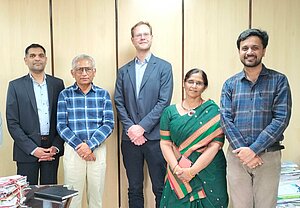April 4, 2024

Dr. M. Venkata Ramana, Director of Research,
Telangana State Agricultural University
Dr. Sebastian Bosse, Fraunhofer HHI, Dr. Kalpana
Sastry. Managing Director, AgHub Foundation,
Mr. Vijay Nadiminti, CEO, AgHub Foundation)
©AgHub team
Fraunhofer HHI is coordinating the newly launched project "Accelerating Climate-Resilient Agriculture in Telangana, India through Data-Driven Agro-Ecological Test Hubs" (ACRAT), which involves a multi-stakeholder collaboration. The project, funded with more than half a million euros by the Federal Ministry of Food and Agriculture (BMEL) within the Innovation and Transformation Dialogue (ITD) in the Bilateral Cooperation Program, has a duration of 22 months, starting on March 1, 2024, and concluding on December 31, 2025.
The agricultural sector in India faces a variety of complex and interconnected challenges that pose significant threats to its sustainability and productivity: Over 60 percent of India's agriculture relies on rain-fed irrigation, exacerbating vulnerability to water scarcity and erratic rainfall patterns. Widespread soil degradation further undermines agricultural productivity. Additionally, the loss of biodiversity, exacerbated by monoculture farming practices, leaves agricultural systems increasingly vulnerable to pests, diseases, and climate variability. Addressing these issues requires a holistic approach encompassing sustainable agricultural practices, technological innovations, and robust policy interventions to safeguard the livelihoods of millions of small-scale farmers and ensure the resilience of India's agricultural sector.
ACRAT aims to transform agricultural practices in Telangana, India, through the integration of advanced, data-driven technologies in the field of agro-ecological production systems. Emphasizing user-centric approaches, technology evaluation on farmers' fields, and human-centered design, the project's focus is on improving agricultural productivity, biodiversity, sustainability, and resilience to climate change. Real-time monitoring of crops using IoT sensors and AI-powered drones allows for early detection of pest infestations, diseases, and nutrient deficiencies, all while incorporating human-in-the-loop AI for informed decision-making. These technologies also facilitate biodiversity conservation by aiding in the identification and preservation of indigenous crop varieties.
Fraunhofer HHI will be pivotal in steering the project towards achieving its goals through its expertise in technology research and innovation, particularly in interactive and cognitive systems. As the project coordinator on the German side, Fraunhofer HHI is responsible for overseeing the collaborative efforts among the consortium members as well as facilitating knowledge exchange and capacity building among the project partners and stakeholders. Furthermore, the institute is leading the research and development activities, focusing on AI and IoT applications in agriculture, with a keen eye on human-centered design principles, incorporating human-in-the-loop AI for informed decision-making, and optimizing user interfaces. Lastly, it is also responsible for integrating and adapting the NaLamKI platform to suit the agro-ecological conditions of Telangana, thus enabling the creation of a dynamic ecosystem based on collaborative synergies.
The AgHub Foundation, operated by Professor Jayashankar of Telangana State Agricultural University (PJTSAU), plays a crucial role on the Indian side. The foundation will conduct important pilot studies involving technology-integrated experiments and knowledge exchange, which are essential for the project's success. Additionally, AgHub will organize capacity building, workshops, seminars, and webinars to ensure the effective dissemination of research findings to agricultural communities. Various departments within PJTSAU, such as the Drone Academy and the Department for Crop Production and Plant Breeding, will provide valuable expertise and actively participate in the pilot studies.
Besides the BMEL, Fraunhofer HHI, and the AgHub Foundation, the Ministry of Agriculture & Cooperation by the government of Telangana, Krishi Vigyan Kendras (KVKs), Farmer Producing Organizations, as well as various tech startups and academic institutions in Telangana, are involved in the project as strategic partners.